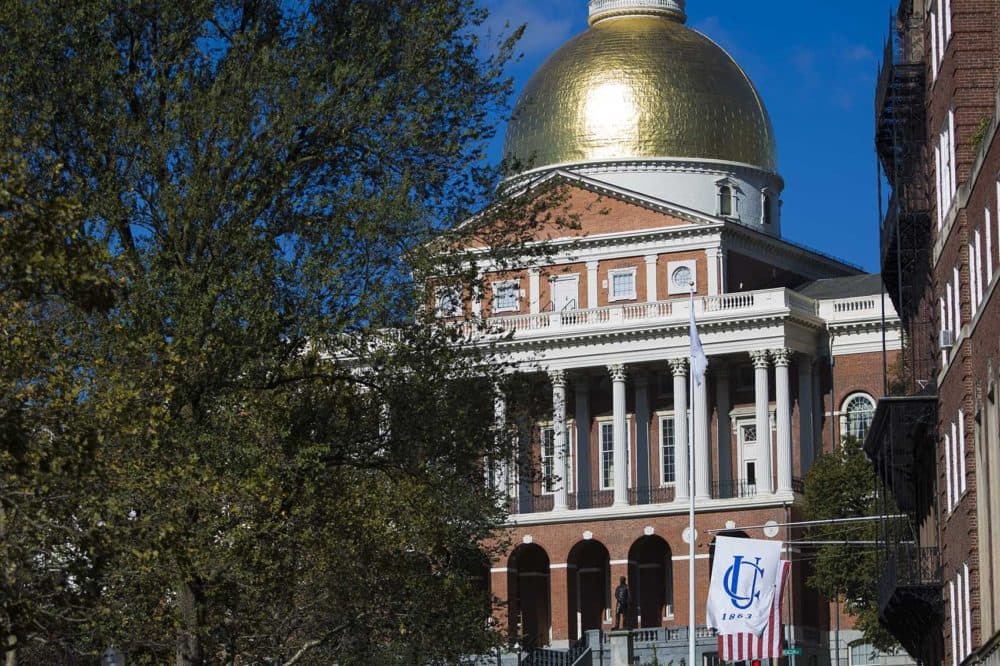Advertisement
Take Two: Lawmakers Again Send Climate Bill to Baker

Sweeping climate policy legislation is back on Gov. Charlie Baker's desk two weeks after he rejected a previous iteration of the same bill.
After Baker vetoed the bill following the end of last session, the House and Senate worked quickly to refile and pass the same language.
The timing of their votes last term — taken the second-to-last day of the session — did not leave the Legislature enough time to override Baker's veto, despite having enough support behind the bill to do so. In the new session lawmakers will have an opportunity to respond to any amendments or a veto from the governor.
"We are on the cusp of a sustainability revolution," Sen. Marc Pacheco proclaimed during Thursday's session as he urged colleagues to build on the bill and engage in more ambitious proposals in the new session.
Among other measures, the bill would lock the state into its goal of achieving net-zero carbon emissions by 2050, set interim emission reduction targets, establish appliance energy efficiency standards, authorize additional purchases of offshore wind power and codify protections for environmental justice communities.
Rep. Thomas Golden and Sen. Michael Barrett refiled the bill this session. The two Democrats led the five months of negotiations that produced final legislation last term.
Barrett said Thursday that he had spoken with senators about the bill over the past week, in part to allay specific constituent concerns.
The Lexington Democrat said new Sen. Adam Gomez of Springfield, who was not a member of the branch when the bill passed Jan. 4, is "reassured" about a five-year moratorium on biomass projects in western Massachusetts, and Sen. Nick Collins of South Boston had brought forward a "legitimate question" from the restaurant industry about appliance efficiency standards.
"[Restaurateurs] wanted to make sure that ovens and warmers and refrigerators could run to the end of their useful lives before these newly efficient appliances provided in the bill have to be purchased, and we were able to reassure Sen. Collins and his constituents that current equipment will not have to be retired early, and that they can rest assured that their already difficult situation will not in any way be compounded by the appliance efficiency language in this bill," Barrett said.
Advertisement
Barrett said he looked forward to "hearing from the governor" after the bill reaches his desk, and Golden thanked House Speaker Ronald Mariano for "holding the line and ensuring that this bill will become law."
Mariano and Senate President Karen Spilka, in a Jan. 19 joint statement, said the bill "rejects the false choice between economic growth and addressing climate change" and pledged to send it back to Baker, who cited concerns about the bill's potential to hold down housing production in his veto message.
Baker has said that if he had time he would have rather returned the climate bill with recommended amendments instead of vetoing it, so amendments are expected to flow from the Corner Office. Another sticking point has been the Legislature's emissions reduction target for 2030, set at 50% below 1990 levels.
"This bill would allow Massachusetts to cement its place as a national leader on climate protection, environmental justice, and clean energy job growth," Peter Rothstein, president of the Northeast Clean Energy Council, said. "We urge the Governor to engage with the Legislature quickly and constructively so that we can all begin the work of implementing the climate solutions made possible by the bill."
If Baker ends up vetoing the bill again, both branches appear poised to surpass the two-thirds threshold required for an override. The House passed the bill on a 144-14 vote. While the Senate on Thursday took voice votes, where individual senators' positions are not recorded, it passed last session's bill 38-2 and there are only two new senators — Gomez and Sen. John Cronin — who did not cast votes last cycle.
The House's 144-14 vote on Thursday compares to its 145-9 total last session but still represents support from more than 90 percent of the 159 current representatives.
Among the new representatives who were not in House for the last vote, all 15 Democrats voted for the bill. The two new Republican lawmakers, Reps. Kelly Pease and Steven Xiarhos, voted against it.
Three House Republicans who had backed the bill last session voted in opposition this time — Reps. David DeCoste, Norman Orrall and David Vieira.